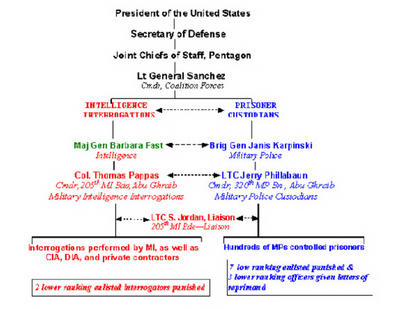
Where does the buck stop in the Abu Ghraib scandal ?
You decide.
I became concerned about this question when, amazingly, the two-star female general, daughter of an Air Force Master Sergeant, emerged unscathed in Army investigations into
 the responsibility for excesses at the infamous Abu Ghraib prison in Iraq. It so happens that I live next door to her domain--Fort Huachuca (pronounced "Wha-CHEW-kah"), which is leased from Sierra Vista, a small town of some 40,000 in southeast Arizona. The sprawling post hosts, among other missions, the Army's training center in intelligence and interrogation techniques.
the responsibility for excesses at the infamous Abu Ghraib prison in Iraq. It so happens that I live next door to her domain--Fort Huachuca (pronounced "Wha-CHEW-kah"), which is leased from Sierra Vista, a small town of some 40,000 in southeast Arizona. The sprawling post hosts, among other missions, the Army's training center in intelligence and interrogation techniques.Major General Barbara Fast set up military intelligence-interrogation in Iraq following the invasion in 2003. Her counterpart, Reserve Brigadier General Janis
 Karpinski was in charge of the military police, who were the custodians for POWs and other detainees. In addition to the huge facility called Abu Ghraib, she also the commanded three other large US- and British-led prisons, with eight battalions consisting of 3,400 Army reservists.
Karpinski was in charge of the military police, who were the custodians for POWs and other detainees. In addition to the huge facility called Abu Ghraib, she also the commanded three other large US- and British-led prisons, with eight battalions consisting of 3,400 Army reservists.For a current background on the evolution of the United States’ attempt to develop a viable legal position on the status of detainees and interrogation for intelligence in our new era of warfare—terrorism—the most comprehensive public presentation to date is Frontline’s (PBS) recent 90-minute TV production, provocatively titled: “The Torture Question.” The presentation also examines the Joint Task Force detention center in Guantanamo, Cuba (Gitmo), where certain interrogation techniques were refined and subsequently adopted in Iraq.

In March 2005, just after General Fast finally took command of the post and the intelligence training center responsible for training interrogators (after lying low for almost a year while the Army completed its investigation into command culpability for the Abu Grahib excesses), I e-mailed a fellow retiree on the board of directors of a large local chapter of the Military Officers Association of America (MOAA):
I noted that General Barbara Fast, after finally assuming command of the Post a few days ago, spoke at your last MOAA luncheon. What’s going on? I can't get rid of the nagging thought that her weak command skills surely had a lot to do with why the scandals at Abu Graib occurred. Now, a year after the general’s return from Iraq, the Army “cleared” her of any responsibility for the Abu Grahib excesses. But isn't it surely a profound mistake to place her charge of . . . teaching intelligence interrogation techniques, even if she has learned from her past mistakes. What’s going on? Is the Army afraid to tell it like it really is, perhaps under pressure from feminists?
His response (heavily edited for brevity) was swift and sternly admonishing; I believe his attitude represents a wide section of American opinion:
I am ashamed that this issue has distorted the views and opinions of some fellow veterans [referring to me:ed] who ought to be more supportive of the good things our folks are achieving in Iraq and Afghanistan, and less accusative and second guessing.
I am also concerned to learn that you have become a presumed 'expert' on General Fast's 'command skills.' If there is any 'fault' to be assigned, it ought to be zeroed on the news media/ACLU and the resulting intimidation of the Army Justice System into court-martialing the 'hazing' participants [referring to Specialists Graner, Lynnie England and seven others:ed] instead of reprimanding or possibly issuing Article 15’s for 'behavior unbecoming.'I [don't] believe any of them were acting in on official command orders.
I am glad that folks like General Fast have stood up to uninformed public criticism that has probably caused lesser individuals to step down and prematurely retire.
It’s interesting that, even as reports continue to surface about severe beatings related to interrogations, Americans seem unwilling to accept that their warriors would resort to real torture of their prisoners--especially under orders. The most they seem to be willing to accept is that the incidents were "brief anomalies" carried out by a few untrained “rogue” soldiers--all of which, in any event, they believe amounted to no more than fraternity house “hazing.”
However, it's not my purpose here to allege torture or to try to define it. My concern is whether, after Army investigators determined that inappropriate activity had taken place and the Army decided to take punitive action, all the individuals in the chain of command have been held accountable. As a case in point, it's an unexplained mystery why General Fast, as the highest ranking officer in charge of all intelligence and interrogation operations in Iraq, emerged with entirely clean hands and, counter-intuitively, was rewarded with the command of the Army's center for teaching military intelligence-interrogation techniques, after a year of remaining in "limbo" upon returning from Iraq. The Army owes the American people an explanation.
Now it's time for you to decide. It’s not really as complicated as you might think. After accumulating pertinent facts, the main thing you need to know is the American military concept of orders and the chain of command:
MILITARY ORDERS & THE CHAIN OF COMMAND
All levels of officer and non-commissioned officer schools teach: The individual at any level who issues, receives, or executes an order is responsible for it. The ultimate responsibility rests at the level where the order was originally issued. Delegation of authority does not relieve anyone of responsibility. Therefore, when problems occur, their origin may be traced and resolved by following the chain of command to the level where the order was issued. It is never an excuse after the fact to claim that an order was not clear and therefore misunderstood. If an order is deemed unclear, it is the responsibility of those receiving it to clarify before executing. Finally, illegal orders are not to be obeyed.
This concept was made crystal clear by a high ranking retired Air Force officer writing recently on a military blog (in reference to religious and sex discrimination/abuse at the Air Force Academy):
I have commanded at every level [up to wing and] I have a newsflash: [L]eadership is always responsible for the behavior of the troops. Not only can leaders not condone [inappropriate behavior], but they are held responsible for the environment they have fostered that allows such [behavior] to prevail. Do you really think all Nazis were responsible for the Holocaust? Do you really think all of the South was responsible for segregation? . . . . There is no guesswork about this.
Looking at the actual chain of command below, whatever the specific facts uncovered by investigators in the Abu Ghraib, where do you think the buck should stop?
 Notes:
Notes:(1) Red denotes INTELLIGENCE-INTERROGATION functions. Blue denotes PRISONER CUSTODIAN (Military Police) functions. In 2003-2004, names shown are the highest ranking officers in Iraq who were found guilty of lapses related to the Abu Ghraib excesses. Maj General Barbara Fast is shown in green because she was the sole exception, despite her position in the chain of command; in fact, she was the only officer authorized to promulgate and approve of military intelligence interrogation methods in Iraq.
(2) The two-way arrows between the two functions indicate the close coordination required between intelligence and custodians (Military Police). This is important to remember, because lots of finger-pointing between the two functions took place during Army investigations, when in fact their activities were closely related, as the chart above shows. So far, the Military Police seem to have lost the contest, if you count the number of low-ranking soldiers the investigators named as responsible (2 enlisted in intelligence, against 7 enlisted and 2 officers in the MPs); of course, General Karpinski was demoted and relieved of duty, although--according to the Army--for "other" unrelated reasons.
Liberals, the Left, and the media are not the only groups criticizing Abu Ghraib--here's a link from conservative The Weekly Standard.
